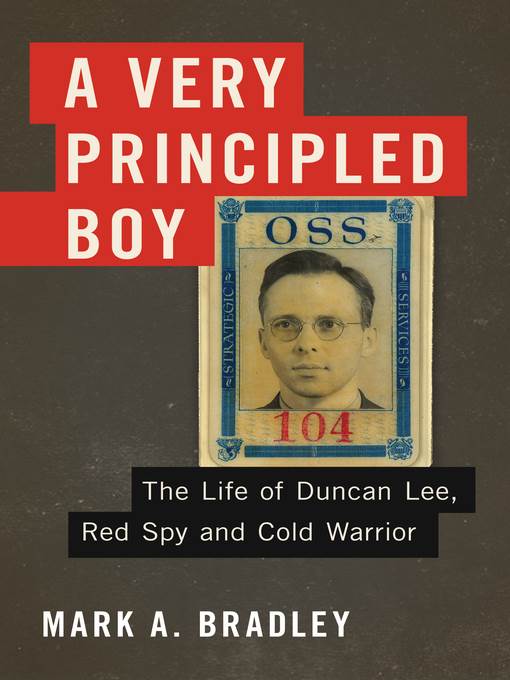
A Very Principled Boy
The Life of Duncan Lee, Red Spy and Cold Warrior
کتاب های مرتبط
- اطلاعات
- نقد و بررسی
- دیدگاه کاربران
نقد و بررسی

February 17, 2014
With access to Soviet archives, former CIA officer Bradley delivers an engrossing biography of Lee (1913–1988), who spied for the U.S.S.R. throughout WWII and was never arrested. Lee, the son of a Protestant missionary, was an idealist who became a communist while at Oxford as a Rhodes Scholar between 1935 and 1938. Lee joined a posh Wall Street law firm to conceal his party membership and later became a special assistant to OSS Director William J. “Wild Bill” Donovan, a flamboyant war hero, when F.D.R. chose him to head the new intelligence service in 1942. Aware of a potential intelligence bonanza, Soviet agents appealed to Lee for help, and he obliged. But despite Bradley’s efforts, Lee remains a perplexing figure: a workaholic nerd with a purely abstract devotion to world revolution, whose commitment to espionage frightened him. He refused to steal documents, always delivering information verbally. The resulting absence of written evidence proved a godsend to Lee when suspicions arose soon after he quit in 1945. In Bradley’s anticlimactic, but still gripping finale, Lee resumes his career and prospers, despite a nerve-wracking, unsuccessful 13-year campaign by the FBI, Congress, and the Justice Department to indict him.

March 1, 2014
An obscure wartime spy working for the OSS, the wartime precursor to the CIA, gets a thorough expose by a government lawyer and former CIA officer. Bradley's sense of frustration at how this arrogant, dissembling underling of William Donovan got away with passing information to the Soviet spy network is partly explained by the general atmosphere of fear raging after the war and the fact that the American government had bigger fish to net--e.g., Alger Hiss. Indeed, while Duncan Lee (1913-1988) did not seem to have done harm to the U.S. war effort, he did provide the Soviets with information about OSS internal employees at security risk, thus tipping off the Soviets to the status of their agents. A child of missionary evangelicals in China, a student at Yale in the 1930s and a Rhodes scholar, Lee became politically radicalized at Oxford, largely under the sway of his socialist wife-to-be, Ishbel. Visiting the Soviet Union, he grew infatuated with communism and, in 1937, announced to his horrified parents "in a mixture of scripted lecture and outright rebellion" that he and Ishbel were joining the Communist Party of Great Britain. Back in the U.S., the couple first came under the scrutiny of the FBI, under J. Edgar Hoover, when their landlady reported their "decidedly pink" views. The outbreak of war brought Lee to Washington to work with Donovan in his new intelligence service, and Lee began passing information to Mary Price, his first handler, a fellow Southerner working for Soviet agent Jacob Golos. From Price, he would be passed to agent Elizabeth Bentley, whose eventual breakdown and confession to the FBI would out Lee and dozens of others, dragging them before the House Un-American Activities Committee in 1948. Yet Lee's subsequent work in China funneling arms to Chiang Kai-shek allowed him to fly under the radar of prosecutors. A murky effort exacerbated by myriad shadowy agencies and a deeply unsympathetic protagonist.
COPYRIGHT(2014) Kirkus Reviews, ALL RIGHTS RESERVED.

Starred review from June 1, 2014
During World War II, Duncan Lee (1913-88) served in the U.S. Office of Strategic Services (OSS, predecessor to the CIA) and spied for the USSR. Bradley, a former CIA officer and a current attorney with the Department of Justice, tells the fascinating story of this complicated spy's life. While studying at Oxford, Lee became interested in communism. After returning to America, he secured a position with the OSS and began spying for the Soviets. During the Chinese Civil War, Lee incongruously assisted Chiang Kai-shek's government in its struggle against Mao Zedong's communist forces. Although he was exposed by a flipped Soviet spy at a House Un-American Activities Committee hearing in 1948, Lee escaped punishment through a combination of deft strategy, bureaucratic bumbling, and sheer luck. After his death, the National Security Agency declassified documents that confirmed his crimes. VERDICT Bradley provides extensive background information regarding the events of the time and all the characters involved, painting a vivid picture of the world in which Lee operated. Readers interested in Cold War history or real-life spy dramas will enjoy this thoroughly researched and highly readable work.--Joshua Wallace, South Texas Coll. Lib., McAllen
Copyright 2014 Library Journal, LLC Used with permission.

























دیدگاه کاربران